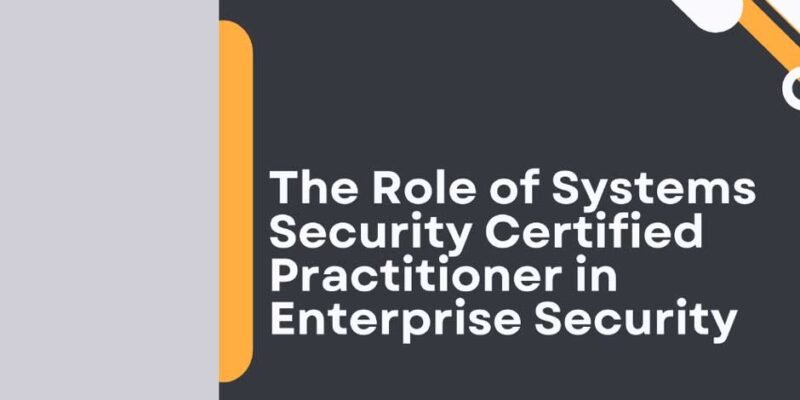
The Role of Systems Security Certified Practitioner in Enterprise Security
Do you have your mind set on the cutting-edge world of Information Security Professionals? If you are pondering over the List Of Top Information Security Certifications in the world, then you should consider the Certified Information Systems Security Professional (CISSP) option. It is among the most sought-after certifications in the field of enterprise security.
The CISSP Certification will validate your technical skills in monitoring and managing IT infrastructure and propel your enterprise security career. So, dive in as this blog explores the significant role Systems Secuity Certified Practitioners (SSCP) play in bolstering enterprise security.
Table of Contents
- Enterprise Security and its Importance
- Who is a Systems Security Certified Practitioner?
- Roles of SSCPs in Enterprise Security
- Conclusion
Enterprise Security and its Importance
Enterprise security collectively refers to the technology and processes used to protect digital assets against unauthorised use or infiltration by cyberthreat actors. This includes the protection of data flowing across networks such as satellite offices and company-specific network infrastructure.
Enterprise security is vital in the era of evolving cyberthreats. Currently, every online communication channel an enterprise engages in poses threat including email interactions. But at the same time, these attacks are never random and require research and planning to be executed. This offers ample opportunity for enterprise security to get ahead of the attackers and create better security measures with the help of SSCPs.
Who is a Systems Security Certified Practitioner?
A Systems Security Certified Practitioner is an IT professional who implement, monitor and administer IT infrastructure. The practitioner does it in accordance with information security policies and procedures to ensure data confidentiality, availability and integrity.
SSCPs work to protect enterprises against threats such as:
Data Breaches or Leaks
The vast amounts of data enterprises hold makes them frequent target for data breaches. Protection against such unauthorised leaks is vital.
External attacks
Enterprises face external threats such as Phishing, Distributed Denial of Service (DDoS) attacks and ransomware. SSCPs must be ready to counter the constantly evolving landscape of cybercrimes.
Insider Threats
Security threats can come from within when insiders or employees with malicious intent compromise an enterprise’s security. SSCPs should practice robust access controls and monitoring of user activity to help mitigate the risks.
Compliance & Regulatory Challenges
Industry-specific standards and regulations are a complex matter and enterprises need proper guidance and understanding regarding the same. SSCPs help the enterprises stay informed on these topics and help them adapt to the associated security practices.
Cloud Security
Cloud technology is capable of storing data and services without the need of physical infrastructure. With data increasingly moving to the cloud, SSCPs can help enterprises address cloud-specific risks and vulnerabilities.
Roles of SSCPs in Enterprise Security
As a Systems Security Certified Practitioner, you will have a plethora of roles to choose from. Let’s explore them:
Network Analyst
You will be tasked with analysing and maintaining network infrastructure security. You will be responsible for monitoring network performance, identifying latency issues, bottlenecks and other problems
Systems Administrator
You will manage and maintain IT systems, ensuring their security and availability. You will handle everything from installing and configuring systems to implementing security measures, such firewalls, antivirus software, and intrusion detection systems.
Security Analyst
You will handle responsibilities such as identifying and correcting flaws in an enterprise’s security systems, solutions and programs. Additionally, you will be guiding them towards improved security measures.
Threat Intelligence Analyst
You will handle the identification and assessment of potential threats to an enterprise’s security. You will be leveraging threat intelligence to identify and decipher emerging threats.
DevOps Engineer
As a DevOps engineer, you will monitor vulnerabilities, and address security issues in the development and deployment of software and systems.
Cryptography
Acquiring Cryptography skills will enable you to create methods to encrypt data. This will ensure a safe threat-free network for the enterprise to access.
Cloud security
As a cloud security specialist, you will be responsible for preventing threats and implementing security controls to secure cloud platforms and services. You will be monitoring cloud systems, detecting threats and assisting with incident response and recovery.
Conclusion
In conclusion, Systems Security Certified Practitioners play a critical role in boosting enterprise security for the modern age. As the integration of the corporate world and online landscape continues to deepen, the demand for SSCPs will soar.
For more information visit : The Knowledge Academy.






